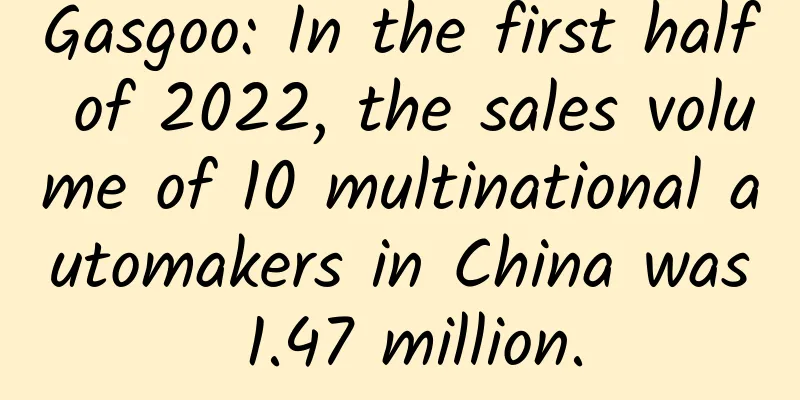Gasgoo: In the first half of 2022, the sales volume of 10 multinational automakers in China was 1.47 million.

|
According to data from the China Association of Automobile Manufacturers, in the first half of this year, affected by factors such as the outbreak of multiple epidemics in China and the continued shortage of chips, the production and sales of automobiles in the Chinese market reached 12.117 million and 12.057 million respectively, down 3.7% and 6.6% year-on-year respectively. Against this backdrop, sales of multinational automakers in China also fell, and most of them fell by double digits. The overall market share of multinational automakers in China has declined, but Volkswagen is still the sales champion According to official data released by various automakers, Gasgoo compiled the sales of 10 multinational automakers in the Chinese market in the first half of the year, among which only Toyota's sales fell by less than 10%. In terms of specific sales, Volkswagen Group is still the sales champion in the Chinese market, with a total of 1.47 million vehicles sold; General Motors followed closely with sales of nearly 1.1 million vehicles; except for these two automakers, the sales of other automakers in China did not exceed one million vehicles. The three Japanese giants (Toyota, Honda and Nissan) still occupy the last three seats in the top five, among which Nissan has the largest decline. Nissan China's sales statistics also include commercial vehicles. Its cumulative sales in China in the first half of the year fell by 22.7% year-on-year, mainly due to the sluggish performance of the commercial vehicle sector. From January to June, Nissan's cumulative sales of commercial vehicles were 97,214 units, a year-on-year decrease of 25.6%. Honda's sales performance was largely contributed by the Sharp Hybrid model, with sales of 100,022 units in the first half of the year. The popularity of hybrid models is partly due to the continued rise in oil prices, and fuel-efficient models are popular. Toyota is still the best performing Japanese automaker in China. Both of Toyota's joint ventures in China have delivered impressive results. Even though the overall auto market was under pressure in the first half of the year, Toyota still showed strong brand competitiveness. (Photo source: China Association of Automobile Manufacturers) But in general, the overall share of multinational automakers in China is still declining. According to data from the China Association of Automobile Manufacturers, in the first half of the year, Chinese brand passenger cars sold a total of 4.891 million units, a year-on-year increase of 16.5%, accounting for 47.2% of the total passenger car sales, up 5.3 percentage points from the same period last year. In contrast, the market share of German and Japanese brands, which previously occupied a considerable share in China, has shown a downward trend, highlighting the gradual rise of Chinese brands. In the field of new energy vehicles, Chinese brands have become the absolute main force. By accelerating integration with intelligent networking, Chinese brand passenger car companies have also taken the lead, and have even surpassed joint venture brands in some technical fields. In addition, with a precise grasp of the Chinese automobile consumer market, Chinese brands have also gained the favor of more young consumers. In addition, relying on the advantages of the local supply chain, Chinese brands have seized more opportunities. Foreign luxury brands also failed to withstand the downward trend In recent years, with the continuous improvement of Chinese residents' income level, China's auto market has shown a clear trend of consumption upgrading. Therefore, the luxury car market has been advancing rapidly and is more able to withstand headwinds than the overall auto market. However, in the first half of this year, due to the impact of the epidemic, the pace of replacement purchases has slowed down, the terminal market is not active, and the sales volume of the luxury car market has slightly decreased by 1.3% year-on-year. Among the nine luxury brands counted by Gasgoo, most of them experienced double-digit sales declines in China in the first half of the year, which was significantly higher than the overall market. As the leaders of the luxury car market, BMW and Mercedes-Benz's sales in China fell by 18.9% and 19.4% respectively in the first half of the year. However, BMW continued to maintain its leading position in the Chinese luxury car market, and the gap between it and Mercedes-Benz widened to 22,900 units, while the figure in the first quarter was more than 7,000 units. Audi still sits firmly in third place, also joining the 300,000-unit club. In terms of products, the popularity of the BMW 4 Series remained unabated in the first half of this year, with sales increasing by 43.8% year-on-year. The BMW M brand, with the momentum of its 50th anniversary, saw sales increase by 37.6% year-on-year. Mercedes-Benz's S-Class sedan increased by 13% year-on-year, continuing to maintain its market leading position, while the market sales of the high-end luxury brand Mercedes-Maybach hit a record high during the same period, with a year-on-year increase of 62%. The gap between the second-tier luxury brands led by Cadillac and BBA is still large, with Cadillac's sales failing to even exceed the 100,000-unit threshold. However, Cadillac's LYRIQ all-electric luxury SUV has started rolling off the production line in May and is now available for order, which is expected to bring new growth momentum to the brand. Lincoln is the brand with the smallest sales decline among the second-tier brands, thanks in part to its record-breaking performance in June. Last month, Lincoln achieved its best performance in China for the same period, with sales increasing by 19% year-on-year and 70% month-on-month. Rolls-Royce is the only luxury brand in the table to have achieved sales growth in China in the first half of the year. The company revealed that demand for all its models continues to be strong, with customer orders now extending to 2023. The company's first pure electric vehicle, the Rolls-Royce Spectre, is currently undergoing extensive testing and is expected to be launched in the fourth quarter of 2023. In general, the decline in sales of foreign luxury brands in China in the first half of the year was due to the impact of the epidemic and chip shortages on production capacity, but on the other hand, the rise of new domestic car manufacturers also had a certain impact on them. Take Xiaopeng and Ideal Auto as examples. In the first half of this year, the two automakers delivered more than 60,000 vehicles, more than doubling year-on-year. The sales of new energy vehicles of multinational automakers is a highlight In the first half of the year, although the production and sales of new energy vehicles in China were also affected by the epidemic, the overall production and sales exceeded expectations because all companies attached great importance to new energy vehicle products and supply chain resources were concentrated on new energy vehicles. According to data from the China Association of Automobile Manufacturers, the production and sales of new energy vehicles in the first half of the year were 2.661 million and 2.6 million respectively, both up 1.2 times year-on-year, with a market share of 21.6%. The sales of new energy vehicles of multinational automakers also contributed to this and became the "pearl" in the crown of each automaker. Although BMW's overall sales in China fell by 18.9% year-on-year in the first half of the year, its pure electric vehicle sales increased by 74.8% year-on-year. Volvo Cars' sales in China fell by 1.3% in the first half of the year compared with the same period last year, but its pure electric vehicle sales increased by 213% year-on-year. Mercedes-Benz's new energy vehicles also achieved good sales results and achieved substantial growth. Mercedes-EQ products achieved a 28% month-on-month growth in the second quarter, among which the EQC pure electric SUV market performed steadily, the new generation of luxury EQA SUV, EQB SUV and large luxury electric benchmark EQS performed steadily in the first year of sales, and plug-in hybrid models continued their strong momentum. In the first half of the year, the overall sales of pure electric vehicles of all brands under the Volkswagen Group increased by 247%. Ford brand electric vehicle sales exceeded 1,900 units in the second quarter, and the delivery volume of Mustang Mach-E still increased by 15.7% compared with the first quarter to 1,918 units, with a total delivery of 3,576 units in the first half of the year. GM's new energy vehicle sales in the second quarter grew strongly, up 12.5% year-on-year. Although foreign brands of electric vehicles have performed strongly, they continue to be threatened by the rise of Chinese brands of new energy vehicles. Against this backdrop, multinational automakers continue to increase their investment in the Chinese new energy vehicle market and accelerate their electrification offensive. For example, despite numerous challenges, BMW is still advancing its electrification transformation and expanding its investment in the Chinese market. At the end of June, BMW's Lida plant, which is oriented towards electric vehicle production, officially opened. The new plant has a total investment of RMB 15 billion and can produce up to 100% electric vehicles. The all-electric new BMW i3 has been put into production here. GM will implement an intensive launch plan for all its brands in China this year, launching more than 20 new and updated models to the market, focusing on new energy vehicles and the high-end market. Following the Cadillac LYRIQ, Buick and Chevrolet's Ultium electric vehicles will debut in China in the second half of this year. It is conceivable that competition in China's new energy vehicle market will become increasingly fierce in the future. Gasgoo.com |
<<: Where are the new market opportunities for OTT? Coocaa Network says: Any screen can be operated
Recommend
Is space junk a serious problem? What would happen if we left it alone?
We collect the garbage from our daily work and li...
$1.3 billion deal aborted: iPad's business prospects unclear?
While the iPad unexpectedly sold well in some are...
How do fish avoid danger? What are some ways to defend against enemies?
Produced by: Science Popularization China Author:...
Microsoft complains about Android phones: Stuck in the air
iOS, Android and WP can be said to have their own...
Cook's coming out on homosexuality: Fireworks of different colors
Cook finally came out. After years of suspicion, ...
WCRF & AICR: Survey shows that high intake of dairy products is associated with higher risk of liver cancer, female breast cancer and overall cancer among Chinese adults
For most people, dairy products are foods with hi...
iOS Developer Notes: WatchKit Development Tips
[[141038]] Since mid-January I have been working ...
5 tips and strategies to attract new users to your APP!
For every operator, the word "attracting new...
How do mobile phones leak information? If you don't know, read this
At present, mobile phones have become one of the ...
Gym WeChat mini program function, how to make a sports and fitness check-in mini program?
Many people pay attention to their appearance, es...
Tech World presents a hodgepodge of black technologies, which one is Lenovo's main dish?
When the CEOs of Intel and Microsoft, first-line ...
Why does the brain delete memories before the age of 3? What did you see when you were a child?
One minute with the doctor, the postures are cons...
Is walking and stopping more effective in losing weight than walking all the time? | Technology Weekly
Compiled by Zhou Shuyi and Wang Xiang Ten years a...
Uncle Kai's Children's Financial Quotient Enlightenment Course
Uncle Kai's Children's Financial Quotient...
Are cats naturally aloof? They actually care about their owners!
Yesterday was International Cat Day (August 8th e...









